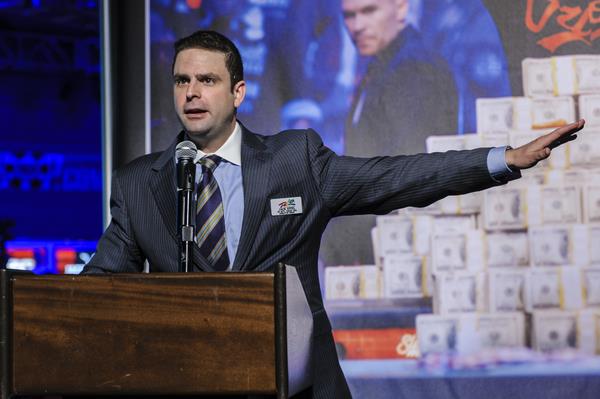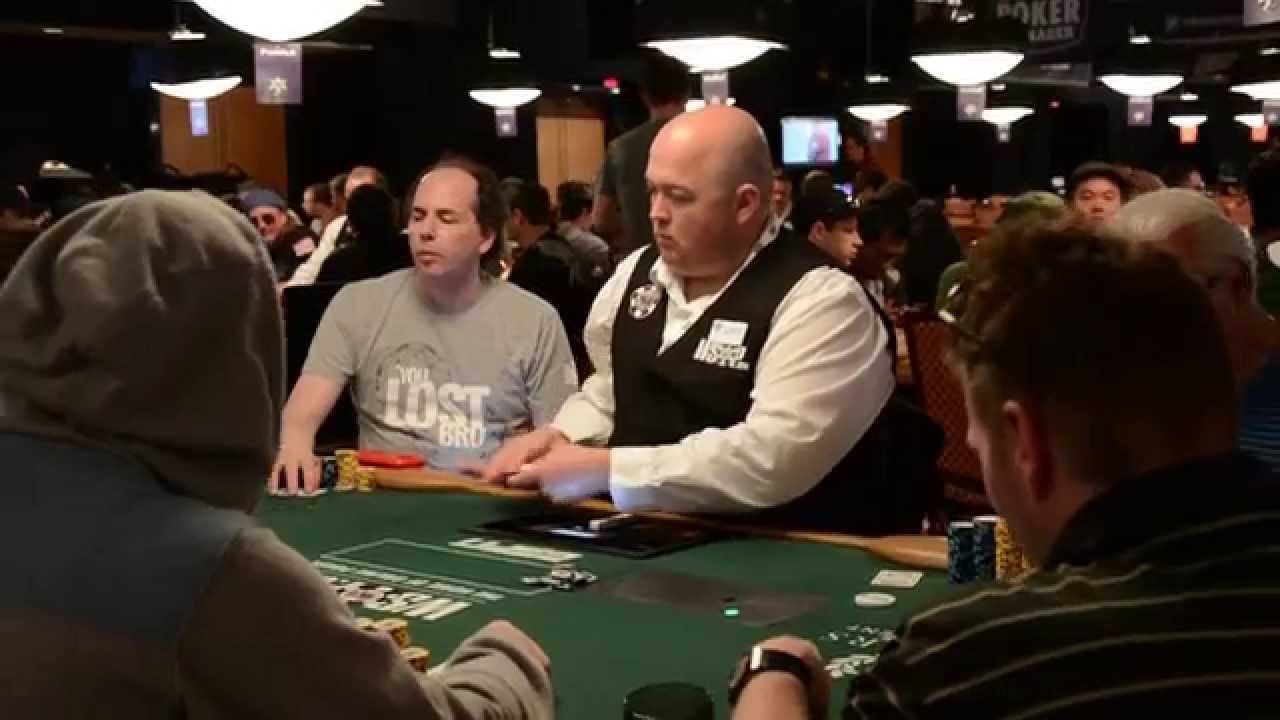Who’s In Charge Of The WSOP? Here’s Everything You Need To Know

Each summer, hundreds of thousands of players head to Las Vegas for the World Series of Poker.
With thousands of people working day and night to ensure everything goes smoothly and with hundreds of millions on the line every year, it’s clear that running an event such as WSOP is no small task.
But whose responsibility is it? Who is really in charge of the WSOP, and who runs the show behind the scenes?
In this article, we’ll try to find answers to these questions, so if you’ve ever wondered about these things yourself, stick around.
Who Owns The WSOP?
Everything belongs to someone in this day and age, and The World Series of Poker is no exception.
This prestigious poker competition is owned by Caesars Entertainment, one of the largest casino and entertainment companies in the US and the world.
Up until 2004, the WSOP brand was owned by Binion’s Horseshoe. In that year, the casino was purchased by Harrah’s Entertainment, together with the full rights to the World Series of Poker.
Later on, Harrah’s became Caesars Entertainment, the company that holds all the rights to the WSOP as of 2021.
So, if you were an eccentric billionaire willing to spend a ton of money to acquire the World Series of Poker, that’s who you’d turn to. But that’s just the official side of things.
Caesars, as the company, is behind the WSOP, but they are a huge corporation. Since the WSOP is one of their most valuable brands, they have an entire division devoted to making sure things run smoothly.
This division employs many people, all of whom have a role in the process, from the dealers to the top executives and everyone in-between.
Inner Workings Of The WSOP
The team working behind the stage to make the WSOP happen every year is large and dedicated.
With several weeks of non-stop play, all of them need to do their jobs almost flawlessly. Mistakes can be expensive, both in terms of money and reputation.
High-Level Staff
When you think about the World Series of Poker, one name probably comes to mind.
Jack Effel (below) is the Vice President of the World Series of Poker, and he’s pretty much the face of these tournaments.
He’s the one making all the important decisions before and during the series.

Running an event such as this takes a lot of preparation.
Effel and his team are in charge of coming up with event structures, prize pool distributions, and taking care of all the logistics, including how many dealers they need to hire.
Of course, all this goes through corporate channels and needs to be cleared by Caesars. However, having been in charge of the WSOP for such a long time, it’s safe to assume Effel gets a lot of autonomy here, and the higher-ups trust his decisions.
If you think any of this is easy, it’s anything but.
The World Series may look like a lot of fun once things get underway, but figuring out all the numbers and making projections based on the limited information is quite a task.
Once the series gets going, Effel is the person making all the tough calls. Whenever something goes sideways, and players aren’t happy with decisions by the lower-level staff, they have to get him involed.
He has the final say in all things WSOP, so his decisions can’t be disputed.
Again, this may sound cool, but the nature of the job is such that there will always be some people not happy with the decision, no matter what you do.
Over the years, Effel has had to make some unpopular calls, but he’s generally respected in the poker community as a very competent, experienced, and fair tournament director.
So, if we were to answer the question from the title with just one name, that name would be Jack Effel. He’s the person most in charge of the WSOP.
He gets to enjoy the praise when things go smoothly but also has to deal with the heat when the opposite happens.
Floor Managers
While Jack Effel is undoubtedly a very competent TD, he’s just one man, and he has to deal with a lot of stuff during the World Series.
With this being such a big event hosting hundreds of tables and thousands of players at any given moment, it goes without saying that one man can’t do it alone.
This is where casino floor managers and tournament directors come in.
These men and women are the ones responsible for making sure things run as planned. They are always in tournament areas and if there is any misunderstanding at the tables, the dealer will call out for the floor, and they’ll come in to resolve the situation.
You should understand that the WSOP is much more than what you get to see on TV.
It’s a huge tournament series that hosts people from all over the world. Not all of them are poker experts (far from it, in fact), and not all want to deal politely with others when issues come up.
So, floor managers will swoop in to save the day whenever there is anything questionable, be it a breach of rules, someone complaining about another player or a dealer, or anything of the kind.
This is a part of their job, as dealers aren’t supposed to argue with the players at any point.
For the most part, their decisions are final, and players have to respect them.
On rare occasions, though, players will insist on hearing a second or third opinion, so they might call in senior tournament directors and, eventually, Jack Effel.
Since World Series tournaments run from noon to late night hours every day for several weeks, there is a need for many floors and tournament directors.
These are usually people who have been around the poker circuit for a long time, know the game’s rules inside and out, and aren’t strangers to stressful situations.
Having said that, it’s never an easy job.
Tournament directors have to make calls on the spot based on the information provided by the dealer and sometimes the players.
When they get it right, they’re just doing their job. If they get it wrong, though, they’ll often feel the wrath of the poker community, which may be justified at times, but the reaction is often very disproportionate.
Dealers

Dealers may be “low” in the WSOP food chain, and we can’t say they run the show – but without them, there would be no show to begin with.
Every year, the World Series of Poker hires an army of dealers to ensure enough people to cover all the events and all the tables. These dealers need to be proficient in dealing with Texas Hold’em and all other poker variations like Omaha, Stud, and draw games.
It’s fair to say that the dealers are the silent heroes of the World Series.
They’re there just to do their job, which is to deal the cards and make sure all pots are pushed to their rightful owners. It sounds simple enough, but it can get exhausting when you do it day in and day out for five or six weeks straight.
Plus, they have to deal with all the rude players out there and take it on the chin, letting floors and tournament directors settle any disputes.
WSOP dealers have a huge role in ensuring the series happens as smoothly as possible. They can’t afford many mistakes along the way, and their dealing skills are, in part, the reason why such a big poker event is possible in the first place.
So, the dealers represent the biggest and the most significant clog in the big WSOP machinery.
They don’t get a lot of TV time, and they don’t make any big decisions like tournament directors, but they have to constantly keep up with the action at the tables and ensure a fair and enjoyable gaming environment.
It sounds much easier than it is.
A Wheel With Many Cogs
If you’ve been wondering who runs the WSOP and how things work behind the scenes at the World Series of Poker, this article has hopefully provided you with some valuable insights. When you read about it, it probably sounds much simpler than it actually is.
All these different segments must work closely together so that the whole thing doesn’t fall apart.
There are more people involved with running the WSOP, of course, but in this article, we’ve focused on the most important ones – those closest to the action and the players.
Having this knowledge will perhaps give you a new level of appreciation for the event and make you a bit more forgiving of any mistakes that happen along the way.
After all, those running the WSOP are just people, and a few mistakes across dozens of thousands of poker hands are a pretty good average if you ask me!


